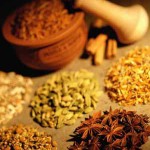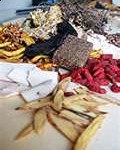Eatin g the human placenta has gone Hollywood. Oprah loves to discuss alternatives to non-conventional medicine. Tom Cruise was planning on eating Katie’s placenta. Chinese Herbal Medicine encourages the mother to ingest the placenta. Other mammals do it. Why shouldn’t we? If you know someone who’s pregnant the concept of having the baby’s placenta prepared and taken in capsule form can bring a huge boost to the new mother as she recuperates from nine months of gestation. Maybe it will just become the hottest new baby gift, for mom? Add some Chinese herbs to boost milk production and both mother and baby are on the way to good health. Check out our article: Eating the Afterbirth, a Chinese Medical Tradition.
g the human placenta has gone Hollywood. Oprah loves to discuss alternatives to non-conventional medicine. Tom Cruise was planning on eating Katie’s placenta. Chinese Herbal Medicine encourages the mother to ingest the placenta. Other mammals do it. Why shouldn’t we? If you know someone who’s pregnant the concept of having the baby’s placenta prepared and taken in capsule form can bring a huge boost to the new mother as she recuperates from nine months of gestation. Maybe it will just become the hottest new baby gift, for mom? Add some Chinese herbs to boost milk production and both mother and baby are on the way to good health. Check out our article: Eating the Afterbirth, a Chinese Medical Tradition.
The Gap Between Diet and Disease, Part II of Diet Theories
An old Chinese Proverb says, He that takes medicine and neglects diet wastes the skill of the physician.
The Chinese have used food and Chinese herbs, basically the human diet, to treat seemingly incurable diseases as far back as records can show. We now have studies that prove that foods and Chinese herbs are effective in treating nearly every affliction known to man. It is a Western concept that the word “diet” refers almost exclusively to a weight loss system. A Chinese diet may or may not focus on weight loss, but it’s primary intention is to treat an ailment. A Westerners “diet” focuses on protein, calories, carbohydrates, vitamins and other nutrients, whereas a Chinese diet focuses on the: Five Flavors, Five Energies, Movements of Foods and Organic Actions of Foods. Maybe this sounds like a foreign language, but the basic concept is pretty easy, if I feel cold, I should eat something warm. If I feel hot, I should eat something cold. (don’t we all do this?)
This is of course a simplification and I know you want more details. It can get a little more technical, so stay with me.
I covered the Five Flavors and Five Energies is a part one of this article. Connect here to read that article.
Here I will delve into the “Movement of Foods” and “Organic Actions of Foods”.
The movements of foods has nothing to do with a musical score. Foods have a tendency to move inward, outward, up or down within us. To move inwards means to move from outside towards the inside. Foods that do this often alleviate constipation. Foods that provide movement from inside towards outside reduce fever and induce sweating. Downward moving foods can relieve vomiting and asthma. Upward moving foods help symptoms of diarrhea, and prolapsed of organs. This is only a general overview, but even a little knowledge can be of great benefit. The movement of foods also corresponds to the seasons.
Here is a brief overview of which foods are best in which seasons. Springtime is all about growth and upward movement so eat foods that also promote an upward movement such as celery, kidney beans and shiitake mushrooms. Foods that move outward are best in the summer these foods have a hot energy and are usually pungent like green pepper, red pepper, black peppers and soybean oil. In the autumn foods with a downward movement are preferred. The downward movement corresponds to the leaves falling. Food such as bananas, barley and bean curd are best in the autumn. Lastly, in the winter eat foods that move inward, just as we move indoors in the winter. Inward moving foods include bitter gourd, clams and seaweed.
Lastly, a brief introduction about the Organic Actions of Foods, it’s not a Greenpeace protest. It simply refers to the specific organ on which a particular food will act. In the West we may think all food goes to the stomach, the intestines and through the digestive organs. But there is more to the saying “the way to a man’s heart is through his stomach”. Different foods really do effect different organ systems in Chinese medicine and diet theory. This can get complicated, many foods have more than one energy and act on more than one organ. Carrots act on the lungs, wheat on the heart, spleen and kidneys, almonds act on the lungs.
Organic actions of foods have been discovered throughout history through both inductive and deductive methods. Traditional Chinese medicine has always put great emphasis on the association of foods and our internal organs. A simple example is chicken liver, it’s helpful for blurry vision, and Chinese Medicine believes our livers are connected to our eyes.
I have simplified how a balanced diet in Chinese theory focuses on the Five Flavors, Five Energies, Movements and Organic Actions of foods. Yet, I hope you understand that from a Chinese viewpoint the word “diet” has almost nothing to do with weight loss and everything to do with how foods effect our body. An organic balanced diet is one that is not necessarily rich in organic foods, but one that balances the internal organs. An individual’s balanced diet is always a mixture of foods with different flavors and energies suited to the needs of that individuals constitution. I hope this is not such a foreign concept now even though it may be a completely new view of diet and nutrition for you. Sun Shu Mao wrote about it approximately 1400 years ago and seeing that history always repeats itself, it’s time to reiterate it today. If you want to learn more check out: Healing with Whole Foods by Paul Pitchford and my other blogs on Chinese Medicine and foods.
Minnesota Now Has Equal Access Law for Acupuncture
 I’ve always enjoyed my vacation time in Minnesota. I happened to be in Minneapolis for it’s Bi- centennial celebration a few years back. They had more than an hour of the most amazing fireworks I’ve ever seen. If you’ve never been there it’s truly the heart-land of America. Real people, real friendly. I had to blog on this news that Minnesota, not on a coast and not really considered the health crazed capital of the country is leading the way with equal access laws regarding alternative medicine practitioners. This new law takes affect and applies to insurance coverage issued, renewed or continued on or after Aug.1, 2009 Very exciting, the next step is on the national level with Medicare.
I’ve always enjoyed my vacation time in Minnesota. I happened to be in Minneapolis for it’s Bi- centennial celebration a few years back. They had more than an hour of the most amazing fireworks I’ve ever seen. If you’ve never been there it’s truly the heart-land of America. Real people, real friendly. I had to blog on this news that Minnesota, not on a coast and not really considered the health crazed capital of the country is leading the way with equal access laws regarding alternative medicine practitioners. This new law takes affect and applies to insurance coverage issued, renewed or continued on or after Aug.1, 2009 Very exciting, the next step is on the national level with Medicare.
Here’s a report from the American Association of Acupuncture and Oriental Medicine, ( AAAOM) by Kris Berggren.
A new law, effective August 1, provides equal access to a licensed acupuncture practitioner for services covered under a regulated health plan. If acupuncture services provided by a physician are covered, the same services provided by a licensed acupuncture practitioner must also be covered. It does not require health plans that don’t cover any acupuncture services to begin doing so.
The law is also a memorial to Edith R. Davis, considered Minnesota’s pioneer acupuncturist, who brought “the whole area of acupuncture into the light of day and (made) sure that we have good standards,” said Rep. Karen Clark, (DFL-Mpls), who sponsors the law with Sen. Linda Berglin.
Advocates said that a growing body of scientific evidence supports the benefits of acupuncture for a variety of conditions and that the treatment is rarely associated with complications. They also said only about a dozen Minnesota physicians or chiropractors are board-certified in medical acupuncture.“Acupuncturists licensed under Board of Medical Practice’s very high standards ironically are not allowed to get reimbursed, and often their prices are lower and they are far more qualified to practice acupuncture than are physicians, even those with acupuncture licenses,” said Rep. Jim Abeler (R-Anoka).
Remember Coke’s “The Real Thing” – Coca Cola drinks made with Chinese herbs may just be “The Real Thing”
 The worlds largest beverage company Coca-Cola has been researching and developing drinks made with Chinese herbs for the past several years. In the US, both Coke and Pepsi have both lost market share with their soft drink products. To offset this marketplace change both have expanded into energy drinks and water products. Will Chinese herbal teas be next? Are Americans becoming health conscious enough to purchase an herbal alternative? I think the tide is changing here.
The worlds largest beverage company Coca-Cola has been researching and developing drinks made with Chinese herbs for the past several years. In the US, both Coke and Pepsi have both lost market share with their soft drink products. To offset this marketplace change both have expanded into energy drinks and water products. Will Chinese herbal teas be next? Are Americans becoming health conscious enough to purchase an herbal alternative? I think the tide is changing here.
I can report first hand that a gas station/ mini-mart off I-5 near Bakersfield California, is now selling ging seng drinks from Korea right at the register. Presumably, for drivers who need an energy boost Coca-Cola with several new Chinese bottling plants in place Coke is set to expand, as they say, “their beverages that contribute to well being”. Coke is adding teas, water and energy drinks for Asian consumers who are avoiding sugary sodas and who now perceive those drinks as fattening. In fact, they have spent over 100 million dollars in the last couple years developing these drinks.
Business in China has more than doubled in the past five years and the herbal teas are even eclipsing Coca Cola soft drinks. With the Asian market growing Coca Cola is working on worldwide expansion of these drinks. But Coco-Cola is not the only one exploring this new market share. Pepsi is not far behind and has also been building factories in China. Pepsi has a product called “Herb Joy” on the Chinese market, a beverage made with several common Chinese herbs including the red date, jujube. Most recently, Coke and Pepsi have been experiencing a boom from bottling a cooling herb tea, originally known as Wanglaoji Cool Tea. This tea originated in the southern regions of China, where spring and summer temperatures are very hot. This herbal tea has been a popular Chinese drink in the summer, it’s a healthy choice to cool the body heat and quench the thirst.
Wanglaoji is based on the Traditional Chinese Herbal Medicine theory of cooling the body. This tea is made by boiling herbs that are capable of reducing the bodies heat and improving digestion, in much the same method all traditional Chinese herbal medicines have been made for centuries. Varieties of this tea have traditionally been sold by street vendors. The big companies are now promoting these herbal teas with slick packaging and expanding to a global market. More importantly for Coke & Pepsi, by adopting a traditional Chinese herb formula as a packaged drink, they are culturally endearing themselves to the Chinese market , translation, higher sales. What about the American market? I think the answer is yes Americans will be seeing more herbal products including herbal beverages on store shelves. American will buy them as long as the taste is “not to herbal” and maybe it will help Americans pay a little closer attention to their health.
6 COMPELLING REASONS TO TAKE HERBS RATHER THAN PRESCRIPTION DRUGS
1. Herbal Formulas are designed to treat the whole body, not just the symptoms.
Most Western medications works because they give you quick relief from symptoms but often do nothing for the underlying root problem. You can treat the root of the problem with herbal medicine rather than just treating symptoms. You’ll start feeling better from the inside out when you treat the whole body. The definition of disease (DIS-ease) is: an abnormal condition of the body causing discomfort or dysfunction. Disease usually happens slowly over an extended period of time and a complete recovery can take just as long if not longer, quick fixes often don’t work because that is not how our bodies works.
2. Herbal Formulas are effective.
Imagine how much more enjoyable life would be if you simply had more energy, a clearer head and a relaxed body. Look at the thousands of studies on pubmed.com that have been done on plant based medicine to prove time tested results are more than coincidence for diabetes, high blood pressure, obesity, menstrual irregularities, migraines, the list is endless.
3. Herbs have a proven track record.
Herbal Medicine is the main medicine for over 80% of the world’s population and has a long established record of effectiveness. Chinese herbal medicine has written documentation going back to 200 AD. Asian cultures have used this plant-based medicine or medicinal herbs for thousands of years and have an inherent understanding of their healing qualities. In fact, many Chinese dishes are made with herbs for medicinal value, for example to enhance digestion, warm the body during cold weather or cool the body during hot weather.
4. Herbs are 100% Natural.
Our biochemistry has evolved over millions of years with plants as our main source of food, so we are naturally compatible with medicinal herbs. Herbal medicines inherently have the same chemical structures that built your body in the first place. Allkaloids, glycosides, flavonoids, saponins and more are all found in natural plants. These are the chemical structures your body needs to repair itself.
5. Herbs are cost effective.
Herbal supplements are the best investment you can make in yourself. They are far less expensive than prescription medication and their greatest savings comes from the prevention of long term illness. The western standard for disease- if you’re not sick, you’re healthy – should not be the measurement of one’s health.
6. Herbs are synergistic; they work with the body’s natural immune system.
Many herbs, like ginseng, for example, are all in one, immune-stimulant, anti-inflammatory, anti-spasmodic and anti-oxidant. Herbal formulas often work on multiple organ systems to improve overall health. No prescription drug can do that.
Warning, Those Sleeping Pills May Be Causing Other Health Hazards
 Friends just returned from their traditional summer camping trip. This years’ trip was more exhausting for one particular husband, he was tired all day long. He wasn’t getting a restful nights sleep even though he loves to camp, was out in the fresh air and ON vacation. The problem stems from his addiction to his sleeping pills, which he needs even on a camping trip. Although the nightly pill provided him some sleep it made him extremely drowsy during the day, especially since he's increased the dosage to get the desired effect. He often wanted to just sit at the camp site and take a nap. If this you or someone you know, it’s time to kick the sleeping pill habit.
Friends just returned from their traditional summer camping trip. This years’ trip was more exhausting for one particular husband, he was tired all day long. He wasn’t getting a restful nights sleep even though he loves to camp, was out in the fresh air and ON vacation. The problem stems from his addiction to his sleeping pills, which he needs even on a camping trip. Although the nightly pill provided him some sleep it made him extremely drowsy during the day, especially since he's increased the dosage to get the desired effect. He often wanted to just sit at the camp site and take a nap. If this you or someone you know, it’s time to kick the sleeping pill habit.
Sleeping pills are an expensive habit both monetarily and physically because of the lingering side effects. Use of sleeping pills is becoming a growing problem. If your taking them for any length of time, you will notice the need to increase your dosage as your body's tolerance grows. At a certain point they become completely ineffective. The most popular "A" sleep pills and other sleep medications were designed to be taken for only a week or two at most. If you continue on this medication longer than two weeks the greatest concern is the side effects, which according to the label “cannot be anticipated”.
Side effects may include: allergies, daytime drowsiness, dizziness, drugged feeling, headache, indigestion and nausea. If you experience any of these side effects, the price you pay for a good nights sleep just went up ten fold. For some, using "A", along with taking a SSRI or serotonin boosting antidepressant, will produce unusual changes in their thinking and/or behavior, according to the insert information. Most definitely alert your doctor if this happens to you.
Side effects of sleeping pills can also develop or change in intensity, so keep this in mind if you suddenly develop indigestion it may be caused by the sleeping pill, not necessarily related to an otherwise digestive/gut problem. Other warning from the manufacturers of this medicine can cause a special type of memory loss. It should not be taken on an overnight airplane flight of less than 7 to 8 hours, since "traveler's amnesia" may occur. Yikes, what’s travelers amnesia? Do you completely forget where you are and where your going. (Apparently this has happened or it would not be a written warning).
The most common risk with prescription sleep aids used long term, is the risk of increasing the dosage in an attempt to keep the effectiveness as your bodies tolerance level increases. The same problem my friends husband was experiencing. The overdose warning alone scares me from going near this drug. “People who take too much may become excessively sleepy or even go into a light coma. The symptoms of overdose are more severe if the person is also taking other drugs that depress the central nervous system. Some cases of multiple overdose have been fatal.”
All we want is a good nights sleep, this is just getting to complicated. I don’t want to die. I’m baffled that a drug with this many warnings can sell as much as it does. There’s more on the label, lets not miss this part of the warning: “Until you know whether the medication will have any "carry over" effect the next day, use extreme care while driving, and you should be aware that they may be more apt to fall.” Hope your taking mass transit if your using a lot of this drug. Older adults, in particular need to be careful. All I can figure is most people don’t read this stuff, they do print it in extra small writing. More from the label, “use "A" cautiously if you have liver problems. It will take longer for its effects to wear off.” “If you take this sleep aid for more than 1 or 2 weeks, consult your doctor before stopping."
Sudden discontinuation of a sleep medicine can bring on withdrawal symptoms ranging from unpleasant feelings to vomiting and cramps.” "When taking "A", do not drink alcohol. It can increase the drug's side effects. If you have breathing problems, they may become worse. "If "A" is used with certain other drugs, the effects of either drug could be increased, decreased, or altered. It is especially important to check with your doctor ."
These are direct quotes from the Ambien official website. Maybe it's time for a natural sleep aid for that restful night of sleep you so desire.
Ginger to Maintain Your Health
![ginger[1] ginger[1]](http://www.pacherbs.com/wp-content/uploads/2009/08/ginger12-150x150.jpg)
Ginger is a common recommendation in my clinic. Ginger is wonderful for digestive disorders and it is anti-inflammatory. “ Drink Ginger tea” is one of the most common suggestions I make.
Drink Ginger tea” is one of the most common suggestions I make.
Here are some great ideas from an article by Jennifer Dubowsky, L.Ac. originally posted Dec. 2008 about the benefits of ginger.
It is interesting to note, too, that ginger has been employed in Chinese herbal medicine for thousands of years due to its numerous beneficial properties. Called Sheng-jiang in the Chinese pharmacopoeia, ginger used alone as a single herb is considered to alleviate nausea, dispel pathogens by inducing sweating, expel cold, as well as stop coughing and reduce excess phlegm in the lungs. In Chinese herbal medicine, Sheng-jiang, or fresh ginger, is considered to have very different properties than Gan-jiang, or dried ginger. Gan-jiang is useful for “cold” pain of the stomach and abdomen, diarrhea due to “cold” in the abdomen, cough, and rheumatism, among other uses. Dried ginger has also been shown to inhibit vomiting.
Video Introduction to Chinese Herbal Medicine
Plant medicine is still the primary medicine for more than half the worlds population. The other half of the globe is realizing it’s time to return to our roots and re-visit herbal medicine. Plant medicine’s safety record is untouched by modern pharmaceuticals.
 Traditional Chinese herbal medicine has a rich history of cooking raw herbs and drinking the decoction as a tea. Today with our modern processing plants we have more options to take herbs in pills form, tablets and now packets. Watch this short video if your new to Chinese herbs . It’s a good introduction to the basics of Chinese herbal formulas.
Traditional Chinese herbal medicine has a rich history of cooking raw herbs and drinking the decoction as a tea. Today with our modern processing plants we have more options to take herbs in pills form, tablets and now packets. Watch this short video if your new to Chinese herbs . It’s a good introduction to the basics of Chinese herbal formulas.


 Drink Ginger tea”
Drink Ginger tea”